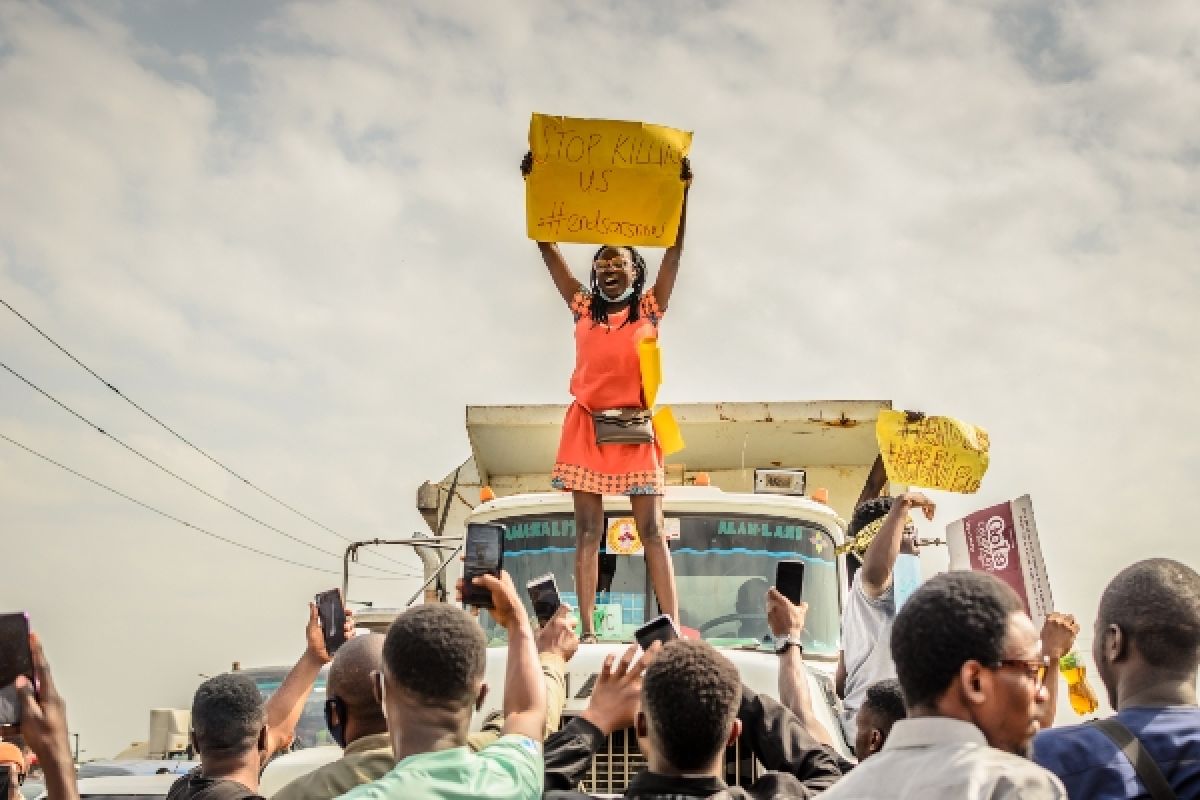While the West seems to have abandoned many of its basic democratic principles during the Covid-19 pandemic, in Africa governments have been voted out of office, lockdowns overthrown – and people have been taking to the streets in defence of civil rights. NewsAfrica examines whether 2020 marks a turning point for the continent – or yet another false dawn.
‘Nigeria will never be the same again, no matter how the #EndSARS protests end,’ the Nigerian journalist Cletus Ukpong told NewsAfrica.
He was referring to the ongoing mass protests that have rocked major Nigerian cities, including Lagos, Abuja, Abakiliki, Jos, Umuahia and many more.
The demonstrations were sparked in October by a viral video of a man allegedly being killed by the Special Anti-Robbery Squad (SARS).
The controversial SARS unit of the Nigerian Police Force has a long history of abuse. But what started as demonstrations against police brutality grew into an enormous mass protest – the result of pent-up anger in the West African state over the dehumanising policies of government, maladministration, and the growing problem of hunger, joblessness and high energy prices caused by the Covid-19 lockdown.
And while Africa’s most-populated country may have witnessed such mass demonstrations before, including the ‘Occupy Nigeria’ protest in January 2012, many observers claim that the #EndSARS protests have been different.
Some even called them the ‘protests of the decade’.
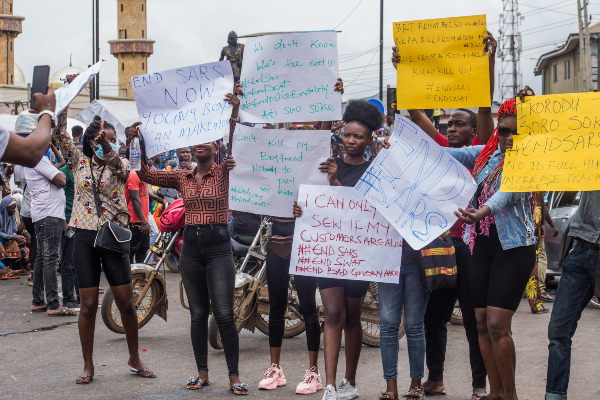
‘No previous protests have been so massive and so widely supported by all segments of society,’ said Dapo Olorunyomi, co-founder, CEO, and publisher of the Premium Times, who was one of the four global winners of this year’s International Press Freedom awards.
‘In the past, you would see that parents would tell their children: please, don’t go out. But now, parents encouraged their kids to participate, despite of the danger,’ said the Nigerian.
Even religious leaders have endorsed the protests. In a recent statement, several bishops, including the head of the Catholics Bishops’ Conference of Nigeria, urged officials to listen to the protesters and added: ‘The audacity and impunity with which the SARS officials have been operating all the while is a manifestation of the failing state of Nigeria.’
The protests have also been remarkably well organised ‘in a way that Nigeria has never seen before’, according to Olorunyomi.
Arrangements have been made, for example, for food and water.
They have medical personnel on standby, ambulances and mobile toilets for convenience.
And the costs of the protests are being funded primarily through decentralised donations from Nigerians at home and abroad.
Local tech start-ups – most of which are led by young entrepreneurs – have also become prominent actors in the campaign, with donations for the firms being used to pay off hospital bills for those injured in protests.
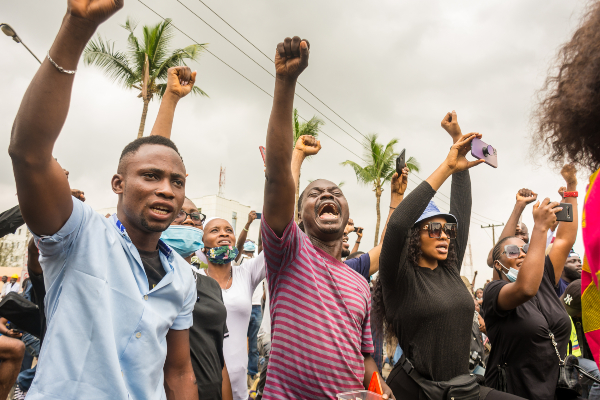
Like the pro-democracy protests in Hong Kong, the #EndSARS movement is unique in that it has no clear leader or hierarchy driving it.
Yet, thanks to the use of online platforms, the activists have managed to quickly raise global support, including from celebrities like Kanye West and Beyoncé, ‘Star Wars’ actor John Boyega and Twitter founder Jack Dorsey.
In Canada, England, Germany, the Netherlands and the United States, the Nigerian diaspora has also organised protests in solidarity with their counterparts at home.
‘Nigerian youth were often seen as lazy and unthoughtful, a perception largely fuelled by the government,’ mused Olorunyomi.
‘Therefore, people were positively surprised by the way that these articulated, educated youth have been organising these protests.’
Several regional politicians soon endorsed the protests.
The Chairman of the Nigeria Governors’ Forum and Ekiti State Governor Kayode Fayemi, for example, stated that ‘there is nothing wrong in what the young people are doing. I think we should encourage them to ask more questions.’
And the Kogi State Governor, Yahaya Bello, said that seeking an end to SARS’s brutality is a worthy cause that must be supported by all.
Within three days of the protests starting in October, Nigeria's Inspector-General of Police, Mohammed Adamu, announced the ‘dissolution’ of SARS under pressure from protesters and politicians.
However, with the SARS officers set to be redeployed to other police departments rather than sacked, the demos have not only continued, but grown louder, with protesters calling for a total overhaul of Nigerian society.
But such muscle-flexing hasn’t be confined to Nigeria. Protest movements have popped up across Africa during the Covid-19 pandemic, and, unlike the partisan movements that flare up from time to time, these demonstrations are somewhat unique in that they’re all led by youngsters.
In Namibia, for example, the capital Windhoek has been brought to a standstill by protestors demanding immediate political action on gender-based violence.
The #ShutItAllDown protests were sparked after the body of a young woman was found in a shallow grave outside the Namibian port town of Walvis Bay.
The protests later spread to other towns when, a week later, a 27-year-old woman was allegedly brutally murdered by her boyfriend because she wanted to end their relationship.
In a petition addressed to the speaker of the National Assembly, the campaigners called on Namibian authorities to declare a state emergency over gender-based violence, and review sentencing laws for sex offenders and murderers, among others.
They also demanded the resignation of Doreen Sioka, minister of gender equality, poverty eradication and social welfare.
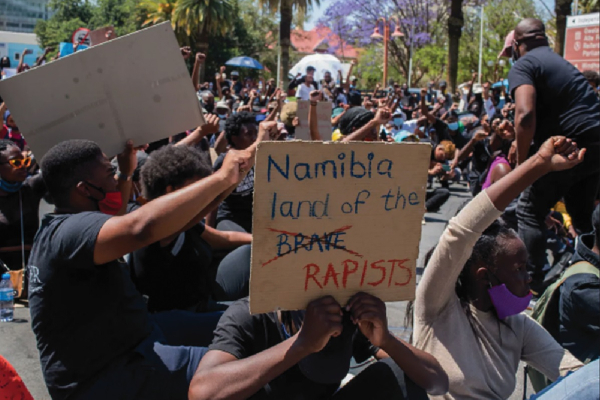
Like neighbouring South Africa, violence against women is a persistent problem in Namibia, in particular, sexual violence and ‘femicide’ – the intentional killing of women or girls because they are females.
Reports earlier this year said police were receiving at least 200 cases of domestic violence a month in the country of slightly under 2.5 million people, while more than 1,600 cases of rape were reported during the 18 months ending in June 2020.
Campaigners said that, like in other parts of the world, the lockdown introduced to slow the spread of Covid-19 had made life even harder for domestic violence survivors forced to self-isolate with their abusers.
But protests haven’t been confined to Namibia and Nigeria.
Young people also took to the streets in cities across the Democratic Republic of the Congo (DRC) in October to campaign about historic murders and rapes committed in the east of the country.
Meanwhile, Zimbabweans have stared down Emmerson Mnangagwa’s infamous security forces as part of the #ZimbabweanLivesMatter protests kicked off by local rappers and influencers.
And it’s not just protests. Despite the pandemic, Africa has witnessed a number of national elections in the past few weeks, including in the Seychelles, Ivory Coast, Guinea, Tanzania, Ghana and Burkina Faso.
This flurry of polling stands in sharp contrast to Europe, where scheduled elections have been cancelled, with civil rights groups lamenting a deterioration of democratic values.
Experts from the American think-tank Freedom House identified what they called a troubling ‘crisis of confidence’ in the US and Europe, where governments have curtailed long-held democratic rights during the pandemic, including freedom of speech, freedom of protest and freedom of the press.
Draconian lockdown laws have also been largely introduced on the whim of ministers in many Western countries, with subsequent attempts to challenge them in parliament or the courts often blocked.
A report by the UK’s Committee on Democracy and Digital Technologies, for instance, warned that Britain under Boris Johnson’s lockdown regime is currently suffering a ‘pandemic of misinformation' that if allowed to flourish will result in the collapse of public trust and see democracy ‘decline into irrelevance’.
The former British Supreme Court judge Lord Sumption went even further, saying in late October that the laws introduced during the pandemic will undo the unity of British society and lead to long-term authoritarian government.
He accused Boris Johnson’s administration of creating 'truly breath-taking' new criminal offences without the legal right to do so, and of giving police 'unprecedented discretionary' enforcement powers, some of which were used to suppress peaceful opposition to its policies.
The grim situation in the UK, where a doctor was arrested and held for 22 hours for reading out a letter objecting to government policy, is in stark contrast to Great Britain’s former African colony Malawi, where, in a move largely ignored by the world’s press, its judges not only ruled the country’s lockdown unconstitutional but ordered the president to go to the polls for re-election, which he subsequently lost.
The Malawi High Court, sitting as a Constitutional Court, barred a lockdown in April and, in September, even ruled that the Covid-19 rules, including the attempted lockdown, were unconstitutional.
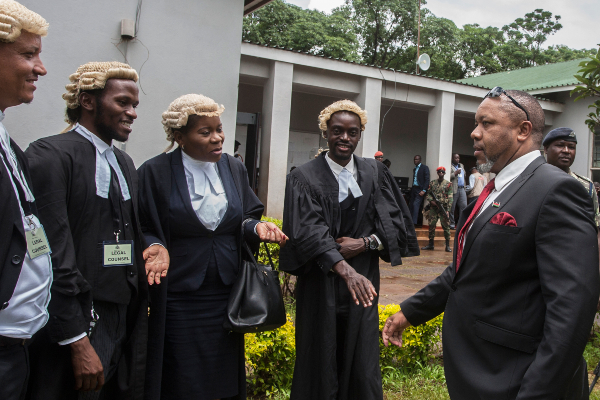
In its decision, the three judges found that the rules were unconstitutional as they were made in terms of a law that did not permit such rules to be made.
They also criticised the government for imposing a lockdown without concern for the poor of Malawi who would not be able to access food and other essentials if they could not leave their homes.
Malawi has currently registered only around 6,000 Covid-19 infections and just 185 people have officially died of the virus.
‘The levels of poverty in Malawi are such that a lockdown without relief would have been equivalent to death,’ said the Malawi political analyst Boni Dulani, who is also the Director of Research and Operations at the Institute of Public Opinion and Research (IPOR).
‘In a survey done by our institute, most Malawians said they were more scared of dying of hunger than of Covid-19.’
Dulani admits that the court order was significant – protestors in Britain have yet to have their case heard in the Supreme Court – but he reserved his most gushing praise for the ‘boldness’ of civil society organisations that went to court and challenged the lockdown order.
‘This is a new approach by civil society organisations,’ said the political analyst, who is also a senior lecturer in Political Science at the University of Malawi.
‘Previously, they have limited their approach to protests and demonstrations but increasingly, they are also very active in seeking the legal option.’
The shock decisions by the Malawian courts in April and September followed a series of landmark democratic moments in the southern African republic, which was ruled by a brutal dictatorship for the first three decades after independence.
In February, the courts nullified the 2019 presidential elections and ordered a rerun, saying: ‘Irregularities had been so widespread, systematic and grave that the results of the elections had been compromised and couldn’t be trusted as a reflection of the votes.’
Against everyone's expectations, opposition candidate Lazarus Chakwera won the re-run election in June, which made it the first time a court-overturned vote in Africa led to the defeat of an incumbent leader.
‘This constitutional court ruling was historic on several fronts,’ explained Dulani.
‘It demonstrates that we now have a new progressive generation of judges that are very willing and ready to make independent judgements that can significantly alter the political landscape.
He added: ‘While challenging election results previously was largely an academic exercise, with little likelihood of the results being reversed, the historic ruling that annulled the 2019 presidential election will certainly embolden other election petitioners in the future.’
The recent opposition victory in Malawi, according to Dulani, is also one of the marks of a ‘maturing democracy’, while he said the court’s decision to force a second vote ‘will go a long way in emboldening the judiciary on the African continent to make decisions on political matters that previously would not have been envisaged.’
The Malawian judiciary is not alone in its new-found confidence.
The African Court on Human and Peoples’ Rights (AfCHPR), which was established in 2004 by African countries, has taken a number of unusually bold decisions this year.
The continental court, which is based in the Tanzanian city of Arusha, ruled, for instance, that Ivory Coast should allow ex-rebel leader Guillaume Soro and the former president Laurent Gbagbo – who was acquitted of war crimes by the International Criminal Court last year – to participate in the countries’ presidential election.
The country’s electoral commission had disqualified both men from the October 31 poll due to their criminal convictions.
Arnaud Oulepo, a research associate at the Centre of Research for International Cooperation and Development, University Cadi Ayyadin Morocco, said the presence of the court made ‘coup d’état or violence’ less likely.
‘The positive thing is that it means that democracy and electoral matters are more and more litigated in courts.’
However, the bold decisions regarding Soro and Gbagbo also seem to have little effect as Ivory Coast simply withdrew its recognition of the court’s jurisdiction in April this year and barred the two candidates from standing anyway.
Ivory Coast’s decision to quit the court, follows in the footsteps of Benin and more authoritarian states, like Tanzania and Rwanda, which left the court after similarly robust rulings.
Tanzania withdrew its support in November 2019, despite being the host of the AfCHPR.
While Rwanda left after growing concerned that the African Court might be used as a platform to ‘change the narrative’ of the country’s 1994 genocide (a criminal offense under the Rwandan criminal code).
‘The withdrawal of these states is unfortunately a bad signal,’ said Oulepo. ‘As former US president Barack Obama said: “Africa doesn’t need strong men. It needs strong institutions.”'
‘Those institutions, including the AfCHPR [court], will never come close to reaching their due potential if they are constantly under attack by leaders who seem to care more about entrenching their own power rather than protecting the rights of their citizens,’ added the Morocco-based law expert, who believes that the judiciary in Africa is starting to play a more significant role in law-making.
Of course, Africa is by no means a utopia. In many parts of the continent, human rights are sharply deteriorating, including in Mali, which is facing ethnic and tribal conflict, as well as the Northern Provinces of Cameroon where the army and rebels alike have both committed atrocities.
October’s elections in Guinea and Ivory Coast were overshadowed by the threat of violence.
While protests in Nigeria are starting to take a troubling – and all too familiar – turn for the worse.
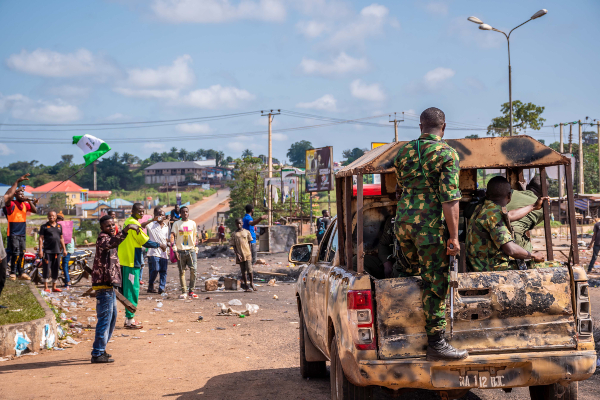
What started out as small peaceful protests that drew concessions from the government, quickly turned violently as gangs attacked protesters in various cities, including Lagos and the capital, Abuja.
Rioters also vandalised public buildings, burned private businesses and stormed prison facilities to help inmates escape, prompting state governors to impose curfews to curb the escalating unrest.
On October 20, meanwhile, the Lagos governor ordered a 24-hour curfew in a move straight from the old play book, and on the same day security forces opened fire on unarmed demonstrators who were waving Nigerian flags and singing the national anthem in Lekki.
The attack was live streamed on Instagram by a witness and caused widespread outrage.
Speaking after the massacre, Nigerian President Muhammadu Buhari said 51 civilians had been killed and 37 injured since demonstrations began, which he blamed on ‘hooliganism’.
He also accused ‘rioters’ of killing 11 policemen and seven soldiers.
Buhari’s statement came two days after Amnesty International put the death toll at 56, with about 38 killed on October 20. Amnesty said investigations on the ground confirmed that the army and police killed at least 12 peaceful protesters in Lekki and Alausa, another area of Lagos where #EndSARS protests were being held.
With the government taking an increasingly firm hand against the protests, not everyone is convinced the #EndSars movement may end up being the watershed moment it appeared to be for Africa’s largest democracy in mid-October.
‘It's unclear what comes next for the #EndSars movement,’ said the BBC Nigeria correspondent Mayeni Jones.
‘On the surface, most of their five points demands have been met. Some of the detained protesters have been released. Panels of enquiry have been set up around the country to investigate allegations of police brutality - although how independent they really are is up for debate.’
Crucially, though, one of the protesters’ key demands – compensation and justice for victims of police brutality – has yet to be answered, and talk has already moved to how the protests could impact Nigeria’s 2023 presidential elections.
Protesters are said to be hoping to capitalise on their new-found popularity to campaign on issues relevant to this youthful nation.
‘The events of the past two weeks have transformed Nigerian youth into a force to be reckoned with in the general elections, less than three years from now,’ said Chioma Agwuegbo, of Not Too Young To Run, an advocacy group dedicated to getting young Nigerians into public office.
She told Al Jazeera that 2023 will be ‘interesting for the future of the country because there’s rage’.
Yet while the streets may be ablaze with fury and the courts may be flexing their muscles in the face of government over-reach, the jury’s still out on whether this defiant new spirit will lead to long-term societal change in Africa.


